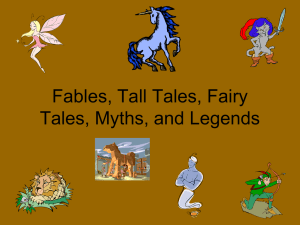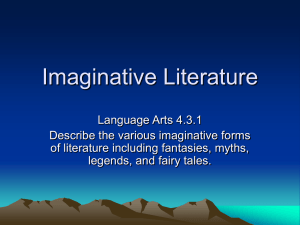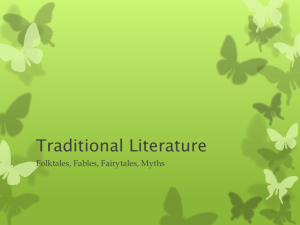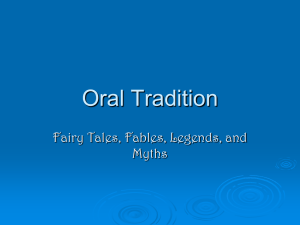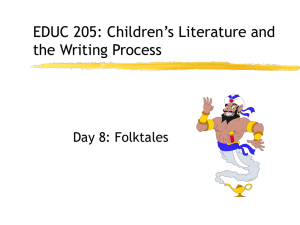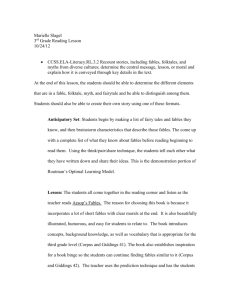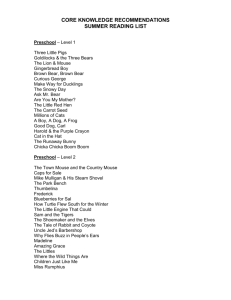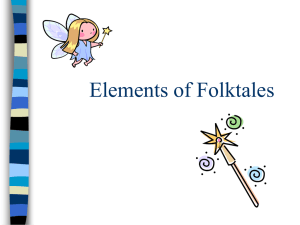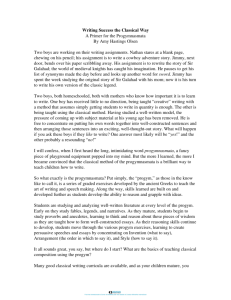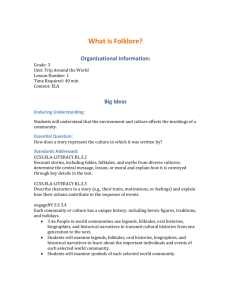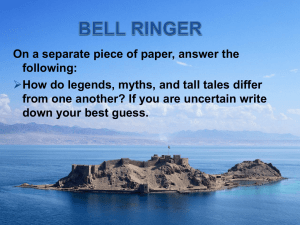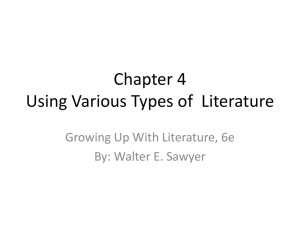folktales myths fairytales legends Genre Study
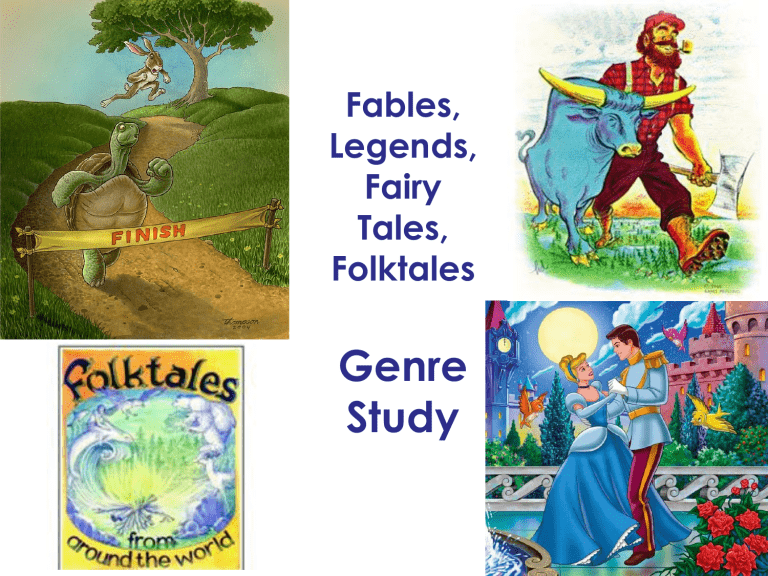
Fables,
Legends,
Fairy
Tales,
Folktales
Genre
Study
Where do these stories come from?
• Told by people all over world for hundreds or even thousands of years
• Oral storytelling of traditional stories
• Unique to a culture, but also lots in common with other cultures
• Written down by researchers/storytellers/authors
– Printing Press invented in 1440
Fables: Elements
• A fictional story that often involves magical creatures and places and has a moral to the story it tells.
• Include elements of the natural environment where the fable came from, along with native animals, forests, lakes, and other features of the region
• Told as a good way of educating children in proper behavior
Fables: Class Mentor Texts
• The Wind and the Sun (Aesop) http://www.youtube.com/watch?NR=1&feature= endscreen&v=WdHhDp2bOAQ
• The Boy Who Cried Wolf (Aesop) http://www.speakaboos.com/story/the-boy-whocried-wolf
• The Ant and the Grasshopper (Aesop) http://www.speakaboos.com/story/the-ant-andthe-grasshopper
• The Tortoise and the Hare (Aesop) http://www.speakaboos.com/story/the-tortoiseand-the-hare
Fables: Examples
• Aesop’s Fables
– Aesop (c. 620-564 BC) was a slave in ancient Greece who was a storyteller. Some think that he, “by his cleverness acquires freedom and becomes an adviser to kings and city-states.”
(Wikipedia)
• “no writings by him survive…numerous tales credited to him were gathered across the centuries and in many languages in a storytelling tradition that continues to this day
” (Wikipedia)
• The Hare and the Tortoise
• The Ant and the Grasshopper
• A Lion and A Mouse
• The Shepherd’s Boy / The Boy Who Cried Wolf
• The Dog and His Shadow
• The Goose with the Golden Eggs
• Jataka Tales
– India, 4 th Century BC
– Tell about the lives of the Buddha; shows a virtue
An ancient coin that is believed to show Aesop. (c, 540 BC)
(Wikipedia)
Fables:
Quick Reads with Your Book Club
SHARE:
• Title
• Author/Country/Year
• Summary
(in own words)
• Moral/Lesson
(in own words)
• Why have people kept retelling this story?
Folktales: Elements
• A folktale is a type of traditional story that tries to explain or understand the world.
• They are NOT considered to be true.
• Orally passed down through the generations and feature morals or lessons. Over many generations, the story may change, but its core remains the same.
• Usually take place long ago in a faraway place
• Talking animals, royalty, peasants, or mythical creatures
• Goodness is always rewarded. Heroes and heroines live happily ever after while villains are suitably punished.
• Usually have no identified author, but they mirror the values and culture of the society from which they came.
Folktales: Examples
• T
Folktales: Class Mentor Text
• The Woman Who Flummoxed the Fairies
(Sorche Nic Leodhas)
• From Tiger to Anansi (Jamaica)
• Why the Sun and the Moon Live In the Sky
(Nigeria, West Africa)
Fables:
Quick Reads with Your Book Club
• Title
• Author/Country
• Summary
• Moral/Lesson
Legends: Elements
• Stories that were once believed to be true, but its content has turned out to be fictional.
• Exaggerated, but within an area of possibility and are believable
• Contain a moral or meaning that is revealed within the story. (This is why these stories have been passed down over time.)
• Is focused on individual people and their accomplishments
• Fictional heroes or real people whose deeds have been exaggerated. They were either so lifelike or so admirable that people wished they were real!
Legends: Examples
• T
Legends: Class Mentor Text
• The Origin of Stories, Seneca legend
(Native American)
• How Glooskap Found the Summer,
Algonquin legend (Native American)
• The Woman Who Outshone the Sun
(Mexico)
• The Boy Who Lived With the Seals (Native
American)
• Peboan and Seegwun (Native American)
Legends:
Quick Reads with Your Book Club
• Title
• Author/Country
• Summary
• Moral/Lesson
Fairy Tales: Elements
• Characters: fairies, goblins, elves, trolls, dwarves, giants, gnomes
• Magic or enchantments
• Good wins over evil, the bad are punished, and the good prosper.
Fairy Tales: Examples
• T
Fairy Tales: Class Mentor Text
Fairy Tales:
Quick Reads with Your Book Club
• Title
• Author/Country
• Summary
• Moral/Lesson
